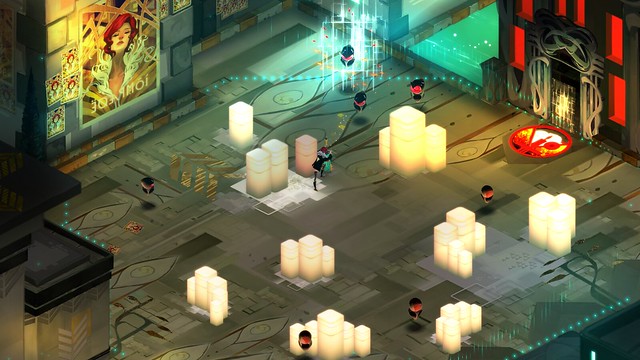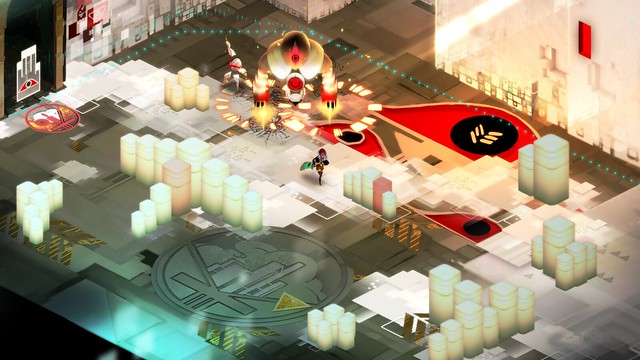One of the stand-out moment at this year’s PlayStation press briefing at E3, for me at least, was when eight independent developers took to the stage to show off their PS4 titles. As Adam Boyes explained here on PlayStation Blog following the show, indie games are a key part of what makes PS4 such a special platform, and it was a landmark moment seeing these fantastic teams sharing the limelight with AAA titles such as Assassin’s Creed IV and Final Fantasy XV.

Leading them out were Greg Kasavin and Amir Rao of Supergiant Games, who announced that Transistor, their bewitchingly beautiful follow-up to smash hit action RPG Bastion, will be debuting on PS4 when development wraps up in 2014.
I caught up with Greg on the showfloor the following day to pick his brains about the role of indies on our new platform, and to find out a little more about Transistor.
PlayStation.Blog: Supergiant started out just a few years ago in 2009 as a humble developer with just two staff members (it’s now up to 10). Fast forward to 2013 and you’re presenting your new game onstage at the PlayStation E3 press conference. That must feel surreal…Greg Kasavin: Yes, it felt pretty surreal! We didn’t think we were going to be at E3 at all, and yet here we are across the room from Watch_Dogs, which looks amazing. I’m not going to overthink it too much, nor will I take it for granted. We’re just very, very grateful that Sony believes in this game, and in us, to give us such a presence. We’ll get back from the show emboldened to make the game live up to what you guys see in it. We’ve got a long way to go, but thankfully it’s shown promise to a lot of people.
PSB: How distracting has E3 2013 been in terms of getting Transistor finished?
GK: We originally specifically planned not to come to E3. I was going to go for selfish reasons, because this is such a momentous E3 with the console launches, but traditionally PAX is more our thing. E3 is where the big guys slug it out, and it’s not traditionally a show for smaller games like ours. But the guys from Sony saw the game at PAX East, they really liked it and asked, “How would you like to show it at E3?” Obviously we ended up saying yes!

GK: When we sat down to think about what our next project was going to be after Bastion we threw all our ideas up on a board. We talked about our pre-occupations, from the fiction, to the gameplay, to the tech, and so forth. We just tried to find common ground.
One of the things we really enjoyed about Bastion was the world-building aspect – creating this fantasy universe from scratch. And thankfully that aspect of the game was well received, so we wanted to try and do that again.
From a gameplay standpoint we were interested in pursuing a more strategic, deliberately-paced mode of play that had more inherent drama to it – more of a back and forth. And from that, we wanted to see what we could do in the sci-fi genre. We felt our gameplay ideas more naturally lent themselves to a science fiction setting. And I had specific ideas around this character and the unusual weapon with the voice coming from within it.
PSB: What with the narration, the music and the camera perspective, anyone who played Bastion should immediately recognize that Transistor comes from the same team. Was that a conscious decision?
GK: Our main goal is for it to have its own distinct identity. We consider it an action RPG like Bastion and it uses the same perspective and so forth, but no aspect of this game was taken for granted. Even the perspective. You’d be amazed how many things we tried before we came back around to how you see it here.
We hope that the result of all that is that the fact it feels like a game from us is a positive experience. But first and foremost it needs to have its own identity and can’t come across like a bunch of nudges and winks to Bastion. Bastion didn’t have that, and had to stand on its own. So if we do our jobs right, that’s going to be the case here too.

GK: You’d be surprised. The extra power of the PS4 is actually super-useful for us, especially the added memory capacity. This game is much more animation-intensive than Bastion already. The fidelity of the animation – I’m not sure we could achieve that on the current gen without significantly scaling it back.
It really helps not having to spend all our time squeezing the game into a much smaller memory footprint. That allows our content creators on the art side and audio side to be more expressive.
Obviously, this is a purely 2D game – it’s not polygonal at all. We’re not making full use of the system’s horsepower, but at the same time I think that the spirit of the PS4 is that it has all sorts of games on it, large and small. That spirit that was showcased at the E3 press briefing, and that’s why we’re here.
I don’t know that a game like this would have made sense at the PS3 launch, but times have changed. Players now have a broader appreciation for these types of experiences. Again, we’re just thankful that our game got that recognition and could be part of this line-up.
PSB: How important do you think indie titles such as Transistor are to the PS4 and its future?
GK: The way in which Sony has been pushing smaller titles has been really inspiring. When I was watching the PS4 unveiling and Jonathan Blow got up there and presented The Witness, I was like “That’s awesome!” For me, as a game player, I was like “I’m sold. I’m in. I’m getting that system so I can play The Witness, if nothing else.”
The idea that there are people out there who might feel that way about our game is really exciting to me. And that there are people at Sony who believe enough in this game to see that potential… it’s incredibly flattering and moving. It makes us want to do our absolute best to make sure the game lives up to that promise that people see in it.
It was great to be part of that group. I was so excited to see guys like Jake Kazdal at 17-BIT and Jamie from Klei. When we saw them backstage – we didn’t know they were going to be there as well – we were like “Oh man! You’re here too!” It was very cool. We find those guys very inspiring and we’re just happy to be a part of it.

GK: I think it’s a very simple answer. They offer really unique experiences.
It’s often said that smaller developers are able to take bigger risks. I don’t see it that way. They have no choice but to take risks. They can’t compete directly – they can’t make something like Watch_Dogs. Though that’s not to say Watch_Dogs isn’t taking risks of its own.
With a small developer, when they put everything on the line that they’re passionate about – that personal expression is going to come across. It makes for very unique experiences that don’t feel like other games. It shows how much potential the broader medium has.
And they’re really wonderful games as well. When we were at EA we were playing games like Braid, and Castle Crashers, and Plants vs Zombies, that were just fantastic by any standard, big or small. And then we looked at the credits and it’s just three people. We were like “Man, we’re working in a team of 100 people and we can’t make something as good as this!” That inspired us to go and do our own thing.
And it helps that they’re inexpensive as well. You don’t have to commit $60 plus tax, or the equivalent in pound sterling, just to see if you like something.
PSB: Which titles in particular caught your eye during the E3 presentation?
GK: Man, there’s a lot of stuff I saw yesterday that looked really, really cool. I was really excited for Galak-Z, which is inspired by classic space opera, anime and stuff like that. It’s very much a game after my heart.
